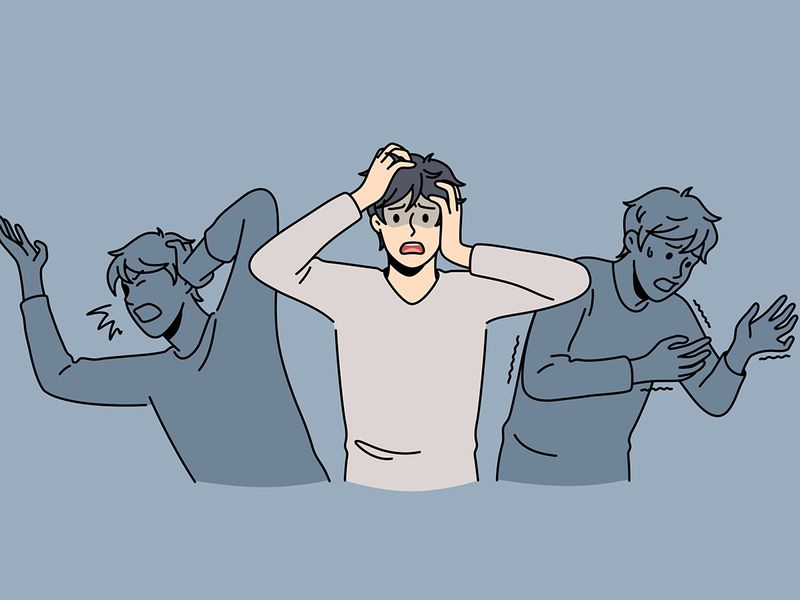
What happens when you don’t even know what you’re fighting with, or fleeing from?
The truth is, your body goes into an emotional shutdown: You go about your daily life normally, yet, it’s as if a thick fog has settled over your emotions and feelings.
It’s a state of numbness and disconnection, as Abu Dhabi-based Sampoorna Singh, a school teacher, describes it. Six years ago, she lost her husband. She doesn’t remember much from that day, or from the days that followed. She just remembers the jarring sounds of an ambulance that was seared into her mind, even though it wasn’t anywhere nearby after the first day. “I can’t even remember clearly who all came to visit us. I just knew that the house was crowded,” she says.
A couple of weeks later, her childhood friend’s mother passed away. Singh recalls the strange detachment she felt, as if she was watching her own life unfold from a distance. “I had known my friend’s mother well, and yet, I didn’t cry, or was even of much support to my friend. It was a haze. I was offering tea and water to people, packing things away, cooking food, and looking back. I don’t know how I was doing it or what I was even doing. I was there, but at the same time, I really wasn’t.”
Singh’s words, “When you’re there, but really, you aren’t”, highlight the numbness, which is the result of a prolonged exposure to the fight-or-flight state. Sometimes, you become a rather detached observer of your own story, rather than an active participant.
The fight-or-flight state

You’ve heard of this commonly used phrase, yet what does it mean? As psychologists explain, it is a physiological response to a perceived threat. It's a survival mechanism that prepares the body to either confront a danger (fight) or escape it (flight).
Simone Horan, a Dubai-based stress specialist and psychologist explains, when we’re faced with a stressful situation, our body activates the sympathetic nervous system, which triggers a cascade of physiological changes. There is an increase in heart rate, accompanied by rapid breathing, dilated pupils, increased blood pressure and muscle tension. This mechanism can kick in anytime, even when the threats around us are imaginary. This often happens to people who have been through traumatic experiences, even if they don't realise it.
While acute stress is a short-term adaptive response, chronic fight and flight state is a long-lasting maladaptive condition, with physiological and psychological repercussions, adds Girish Banwari, a Dubai-based psychiatrist. In theory, it’s a good thing. You’re forced into action, in order to temporarily protect yourself for something unpleasant and difficult. However, prolonged exposure to stress can result in repercussions that can linger for days, months or even years. Physiologically, prolonged stress causes continual stimulation of the sympathetic nervous system leading to release of epinephrine and norepinephrine, leading to increased cortisol secretion, which are responsible for elevating the blood sugar levels, increasing the heart rate and blood pressure.

Physiologically, prolonged stress causes continual stimulation of the sympathetic nervous system leading to release of epinephrine and norepinephrine, leading to increased cortisol secretion, which are responsible for elevating the blood sugar levels, increasing the heart rate and blood pressure...
As a result, the person is predisposed to metabolic disorders, like diabetes, hypertension, cardiovascular and cerebrovascular disorders. The stress also overworks the immune system, leading to excessive vulnerability to infection and autoimmune disorders.
Psychologically, the constant fight and flight state creates hyperarousal, cognitive blurring, impaired concentration, and higher risk of developing depressive and anxiety disorders.
What causes this state?
There are several stressful events that can cause the mind and body to react, including school bullies, accidents, grief of losing someone, adds Horan. Moreover, your nervous system remembers past threats and triggers the fight-or-flight response when it detects similar situations. The flashbacks of the traumatic event begin to play in your mind, too.
So, after a prolonged exposure to such stress, you might no longer realise that you’re in a constant state of fight-or-flight.
The signs of perpetual fight-in-flight

Your emotions go into hibernation.
Saliha Afridi, a clinical psychologist from LightHouse Arabia elaborated recently, in a wellness podcast The Balance Theory, “When we remain in fight or flight mode for too long, our bodies can enter a dorsal vagal state, which is a protective response that causes us to emotionally shut down. It’s like watching our own life unfold from a distance, as if we’re detached observers of a movie rather than active participants. In this state, we may feel numb, emotionally disconnected, or as though a thick fog has settled over our feelings. The world around us might seem less vivid, and our own reactions can feel muted or distant.”
This state of emotional detachment is the body’s method from protecting us from pain that feels too overwhelming, to deal with directly. The safest option is to shut down. We go about our lives daily, but we aren’t fully present, as if a glass wall is separating us from our own experiences.
Numbness and detachment
If you’re in a state of permanent stress, the body’s response system becomes overwhelmed. You’re numb to everything, explains Horan. You feel a sense of disconnection. “Such a person finds it difficult to respond to emotions, which leads to impaired focus and concentration, forgetfulness, hopeless and engage in self-destructive behaviours.”
This is a particularly important sign to watch out for, adds Horan. Don’t get impatient or more aggressive with a person, if they appear to forget more things than usual, or aren’t reacting appropriately to a certain situation. “At this point, they require an empathetic approach,” she says.
For instance, Ranjana Chatterjee, an Abu Dhabi-based yoga instructor wishes that she had been more sensitive to her friend, who had been suddenly fired from her job after a particularly unpleasant confrontation with her boss, years ago. “After a few weeks, we thought she was alright, and would get a little annoyed with her for not meeting us often,” recalls Chatterjee, who feels rather guilty for being upset when her friend didn’t participate in her birthday celebrations, citing exhaustion as a reason. “I should have known that the incident had such a strong scarring impact on her, rather than trying to get her to focus on my birthday,” confesses Chatterjee.
Sometimes, people might even avoid circumstances, situations that can trigger emotions or memories that they do not wish to deal with, explains Horan. It’s a survival response, as the nervous system prefers to keep us safe by using an avoidance response. The opposite can happen too: People might engage in similar situations as a way to try and establish control over their previous traumas.
Dissociation

As you constantly remain in this fight-or-flight mode, there is an excessive release of hormones in the brain regions that involve memory. To protect themselves from the intense emotional pain, the brain may activate a dissociation response. This involves temporarily disconnecting from reality, which can manifest in various ways, explains Horan. The brain can even distort perceptions of time and space, possibly leading to even a reduction in memory.
Moreover, stress alters the brain, leading to a reduction in memory. Depending on the severity of the trauma, the brain struggles to store a coherent narrative of the event, explains Horan. Instead, there’s a focus on sensory details like smells, tastes and sounds. The repressed memories resurface, owing to triggers, even when seemingly unrelated to the original event.
Sometimes, it can be something as innocuous as the scent of a perfume. For instance, Avantika Panwar, a Dubai-based marketing professional feels nauseous, whenever a scent of a certain perfume wafts through her office. For a while, her mind goes rather blank, and her hands tremble. She thinks of the day that her mother wore the perfume, before a car accident where she almost lost her life. She finds it particularly hard to breathe, and has to keep drinking water. “It takes me at least an hour to feel like myself again. My muscles just tighten so uncomfortably, I keep tapping my foot, while trying to work, sometimes even sweating. I can’t even stop work sometimes, so I just have to keep functioning,” she says.
A chronic sense of fatigue

Stress wears the body down. You’re in a state of constant fatigue, explain the psychologists. Your sleep patterns are impaired, and sometimes, you cannot even concentrate properly.
Avani Iyer, a Dubai-based psychologist, explains that chronic stress elevates cortisol, the stress hormone, disrupting sleep and causing fatigue. The body is in a state of hypervigilance, where the body and the mind are constantly alert. You experience nightmares, frequent waking, restless sleep or unable to fall asleep.
Healing from persistent fight-or-flight
As Afridi explains, “Healing from this state involves recognising and accepting that this detachment is a natural response to feeling overwhelmed. It’s not about forcing ourselves to feel or act a certain way, but rather about creating a sense of safety that allows us to gently reconnect with our emotions. This might mean acknowledging our feelings without judgment, or finding ways to engage in activities that bring a sense of calm and presence.” She adds: The path out of this state is not straightforward. Progress comes in small, uneven steps. You need to be patient with yourself, and move at your own pace. By understanding this protective mechanism and being compassionate with ourselves, we can slowly move from a state of numbness to one where we can experience the full range of our emotions, feeling connected once again.
Horan and Iyer share practical techniques:
Deep breathing exercises: Deep, slow breathing can activate the parasympathetic nervous system, counteracting the fight-or-flight response.
Progressive muscle relaxation: Tensing and relaxing different muscle groups can help reduce physical tension and promote relaxation. For example, tense your feet as tightly as possible for 5-10 seconds, then release and relax them. Work your way up your body, tensing and relaxing different muscle groups, such as your calves, stomach, chest, shoulders, arms, and hands.
Get creative: Creative activities like art, crafts, gardening, cooking, or even puzzles, juggling, music, theater, dancing, or engaging work can promote flow and focus. These pursuits stimulate the prefrontal cortex, reducing high-stress levels of noradrenaline. When fully immersed in an enjoyable activity, the brain becomes hyper-focused, processing only relevant information and filtering out distractions, including stress.
Healthy diet: A balanced diet rich in nutrients can support overall health and well-being.
Regular exercise: Physical activity can help reduce stress and improve mood.
Adequate sleep: Aim for 7 to 9 hours of quality sleep each night.
Limit stress triggers: Identify and minimise exposure to stressors whenever possible.











